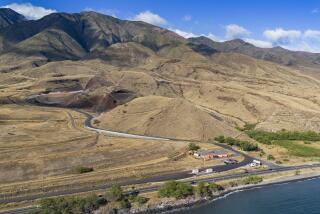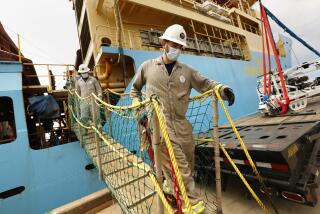Development vs. Environment in South Pacific : Papau New Guinea: Prime minister acknowledges threat to ecology, but opposes lawsuits filed by villagers against a polluting mine. He wants nothing to scare away foreign investors.
- Share via
PORT MORESBY, Papua New Guinea — The once-sparkling river chokes on milky-gray sludge from a huge mine upstream and the prime minister is furious--not with the mine owners, but with the villagers suing them.
In the biggest lawsuit ever filed in neighboring Australia, 16,000 villagers who live along the Ok Tedi River seek $3 billion in damages from Broken Hill Proprietary Co., owner of the gold and copper mine.
Prime Minister Paias Wingti opposes the suit. He wants nothing to interfere with a minerals boom he hopes will bring prosperity to Papua New Guinea, parts of which had not seen a European until three generations ago.
Wingti acknowledges that development can bring environmental problems, but fears villagers near other mines will file copycat suits, stalling resource exploitation and scaring away foreign investors.
He has threatened to draft retroactive laws to block the claim against Broken Hill Proprietary, Australia’s largest corporation.
“The claim has certainly caused damage to investor confidence,” the prime minister said. “Our country is a developing country and we need substantial investment capital if we are to develop our resources.”
Several large multinational corporations already do big business here.
Chevron Corp. of the United States, for example, has a large oil-development project in the central Highlands. An Australian subsidiary of Canada’s Placer Dome Inc. is a major partner in one of the world’s richest gold mines, at nearby Porgera.
The Ok Tedi mine is 52% owned by Broken Hill, 30% by the government and 18% by Metal Mining Corp. of Canada. It earns billions for the local economy, but that is no consolation to more than 100 clans that hunted, fished and farmed downstream for thousands of years until the mine started dropping tailings into the river a decade ago.
They allege that 10,000 tons of waste rock containing copper, lead, zinc and cadmium is dumped in the water daily.
“Nothing lives in the river. We can’t drink the water. The trees on the banks are dying,” said Rex Dagi, a chief of the Miripki clan who is a party to the suit. “The mine makes money, but our traditional way of life is ruined.”
The court case highlights the heavy toll taken by economic development on the fragile South Pacific environment: rain forests are being logged illegally, coral reefs are polluted, fish stocks have been plundered by foreign fleets and small islands face chronic problems of overpopulation.
Broken Hill says a half-built tailings dam that would have handled the Ok Tedi waste was destroyed by a landslide in 1984. Because of such engineering problems as frequent earthquakes and rainfall 390 inches a year, the government allowed mining to continue without a dam.
Whatever the damage to the river, the mine has brought many benefits.
Other landowners near the mine have been paid millions of dollars in compensation and royalties. Jobs and education have been provided for thousands of people. Health care has reduced the infant mortality rate from 33% to 3% and raised average life expectancy from 30 years to over 50 years.
Negotiations among miners, the government and landowners are often difficult in Papua New Guinea, where more than 80% of the 4 million people still live at the subsistence level.
All three are haggling over the ownership of a proposed gold mine in an extinct volcano on Lihir Island, 560 miles northeast of Port Moresby.
The most violent example is on Bougainville island, 600 miles northeast of Port Moresby, where a dispute between landowners and an Australian mining company led to a secessionist war in which more than 500 people have been killed. The world’s largest copper mine has been closed.
Wingti has not dismissed all environmental issues. His government enacted tough regulations against indiscriminate logging by foreign timber companies. It also proposes a tribunal to resolve land disputes and plans to establish a $12-million compensation fund for the river people.
He has warned foreign lawyers against trying to drum up business among disgruntled villagers. “We do not want to see our country being used by lawyers from outside,” he said in a television interview.
The prime minister is angry that Australian lawyers for the Ok Tedi villagers filed the suit in Melbourne, where Broken Hill has its Australian headquarters, rather than in Papua New Guinea.
Nicholas Styant-Browne, the villagers’ lawyer, said the Ok Tedi “is biologically dead. The landowners want rehabilitation of the river, monetary compensation and a proper waste-handling system set up at the mine.”
Dagi, the Miripki chief, said the villagers are “not against mining, but it has to be done properly to save the environment and protect the people.” The suit alleges that pollution flows from the Ok Tedi into the 700-mile Fly River, Papua New Guinea’s longest waterway, then into the sea near the top end of the Great Barrier Reef off Australia’s northern coast.
Styant-Browne said he expects thousands of villagers along the Fly to sue. Broken Hill maintains that both the Fly and the reef are healthy.
More to Read
Sign up for Essential California
The most important California stories and recommendations in your inbox every morning.
You may occasionally receive promotional content from the Los Angeles Times.













